- Home
- Paullina Simons
Six Days in Leningrad Page 2
Six Days in Leningrad Read online
Page 2
Kevin knew Atlantic Ocean beaches. I knew the dirty sand on the Gulf of Finland. It had been enough for me when I was a child. I spent ten summers of my life in a tiny Russian fishing village called Shepelevo near the Gulf of Finland. Three months of every year, I slept, read, fished, swam, and played with other kids, from dawn to dusk, free and in bliss.
I didn’t want to go back there.
I lived ten years of my life in a communal apartment, nine families sharing thirteen rooms, two kitchens, two bathrooms.
I didn’t want to go back there.
When I was four, my father was arrested and spent the next five years of his life — and mine — in a Soviet prison, in a Soviet labor camp, in exile.
I lived alone with my silent mother. I was not interested in reliving any part of that.
There was no romanticizing our life in Russia. If it weren’t for my unwritten book, why on earth would I go back?
Papa and his (then) only child. February 1965.
MOLOTOV’S GRANDSON
My father got me a travel visa through Radio Liberty. The already painful Soviet visa process was further complicated by the fact that we were going to stay with my father’s best friend Anatoly, instead of in a hotel like normal, non-suspicious tourists.
“Papa, why don’t we stay in a hotel?”
“What hotel?”
“I looked in my St. Petersburg guide, and it lists two great hotels in Leningrad —”
“Don’t call it Leningrad.”
“Fine. St. Petersburg. Two great hotels: Grand Hotel Europe, and Astoria.”
“Astoria is a very nice hotel.”
“So it says. It says it’s located conveniently close to the statue of the Bronze Horseman. That’s good for me. As you know, that’s what I’m calling my book The Bronze Horseman.”
“I want to speak to you about that. I think it’s a terrible title.”
I sighed. “Papa, it’s a very good title, and everybody likes it.”
“Who is everybody?”
“My agent, my editor. My former editor. My husband.”
“They don’t understand.”
“Fine. Can we go back to hotels? Astoria is nice?”
“Yes, but Paullina, I can’t stay in Astoria. I’m retiring in August. And my company won’t pay for such a hotel.”
“Grand Hotel Europe?”
“Very nice hotel, in the center of town, close to Nevsky Prospekt. So convenient.” He sounded like a travel agent.
“So which one is better?”
“Paullina, we can’t stay in either. We have a perfectly decent apartment to stay in with Anatoly and his wife, Ellie. They loved you very much when you were a child. They can’t wait to see you. Their daughter Alla can’t wait to see you either. You remember her, don’t you?”
Of course I remembered her. She had been my best friend.
“Anatoly and Ellie have room. You’ll be comfortable. It’ll be fine.”
I thought about it. “How close are they to the center of town?”
“Okay fine, their apartment is not the Grand Hotel Europe. It’s not going to be fifty paces from Nevsky Prospekt. They live on the outskirts of town, the last stop on the metro. You do what you like, but I have to stay with them. They’ll never forgive me if I don’t.”
I continued to quiz him about the two hotels. My father finally admitted to me that my parents’ wedding reception was held on the top floor of Grand Hotel Europe.
“I have to stay there then. There is no question.”
He told me that when I was a baby, I had helped him to smuggle strictly forbidden books out of Grand Hotel Europe. He received them from an American friend who was visiting Russia and staying at the hotel. KGB agents checked every bag that left the hotel as a matter of course. They were watching my father particularly carefully because of a provocative letter he had sent to Pravda; he had to be cautious. So when he received the books from his American acquaintance, he put them underneath me in my baby carriage, wrapped the blanket around me and the books, and wheeled us out into the street.
He smuggled out Thirteen Days That Shook the Kremlin: Imre Nagy and the Hungarian Revolution by Tibor Meray, Bitter Harvest: The Intellectual Revolt Behind the Iron Curtain, a collection of essays and stories edited by Edmund Stillman, The New Class by Milovan Djilas, and The Communist Party of the Soviet Union by Leonard Schapiro.
Years later, in 1994, a former KGB agent who used to watch my father met him at a gathering in Munich and asked him, “Yuri Lvovich, tell me, that winter night, how did you get those books out of the hotel? We were watching you so carefully.”
After my father told him how, the KGB agent shook his head and said, “We underestimated you, Yuri Lvovich.”
During our next conversation, I said to him, “Papa, how about if we stay with Anatoly and Ellie for a few days, but then I will get us a suite at Grand Hotel Europe and we’ll stay there the rest of the time.”
“How much is a room there? Four hundred dollars a night?”
“Five hundred.”
“Oh my goodness.”
“Don’t worry about it. It will only be for a few nights.”
But because I was going to be staying part of the time with friends, I couldn’t get a simple tourist visa. I needed to get a letter of invitation from a business. My father said he would take care of it. Radio Free Europe/Radio Liberty, which had bureaus in Prague, Munich, Washington, Moscow and St. Petersburg, would provide me with an invitation.
My father’s colleague in Washington personally walked my visa application over to the Russian embassy to be processed.
“The man who is walking with your application, doing you a favor, processing your visa, treat him with respect,” my father told me. “He is Molotov’s grandson.”
Vyacheslav Molotov had been Stalin’s foreign minister, responsible for the war with Germany and the war with Finland, and for unwittingly giving his name to the incendiary cocktails the Finns invented in his honor.
“Not Molotov’s grandson!”
“Yes,” my father said, lowering his voice, “but don’t say anything to him.”
“Why?” I asked. “Doesn’t he know whose grandson he is?”
My father said it was a very complicated subject and spoke no more about it. I did think there was something Homeric about Molotov’s grandchild traipsing to the Russian embassy to get me my Russian visa so that I could go to Russia and write about the period when his grandfather had been making history. I sent Molotov’s grandson my three published books, all signed to his wife, and thanked him for helping me. I really wanted to ask him about his grandfather, but didn’t.
GRAND CENTRAL STATION
Grand Central Station wasn’t in New York. It was in my house in Texas.
With barely two weeks between our move and my trip, and having not yet unpacked, I was trying to get some work done before we left. But not only was my mother-in-law visiting from New York for ten days, my builder must have had every contractor in Dallas stopping by my house at least twice a day.
I had made a firm commitment to myself that I would finish reading one of my Russian research books before we left, but that was before Eric, the screen-door guy, came to replace the screen door — twice. The painters hadn’t finished painting before we moved in, and a quarter of the power outlets weren’t working, including the one my computer was supposed to be plugged into. The faucet in the kitchen was leaking. The icemaker upstairs wasn’t making ice, while the frost-free refrigerator was making frost.
The days were too full for me to do my regular work — research, beginning my new novel, plus being a mom to three small kids, all home for the summer — much less prepare to travel to Russia. But every once in a while, my dad would call and say, “Are you ready for our trip?”
“I am,” I’d say. “But I have to go because the Rotor Rooter guys are at the door. We have an overflow problem in one of our shower drains.”
Somehow, a week before I left for Russia
, I managed to squeeze in an event at a local bookstore in Dallas for the publication of Eleven Hours, and a live TV interview in Austin, Texas, eight round-trip hours away.
Meanwhile the door latches in the house were nearly all broken, the garage door keypad was not opening the garage, and the concrete driveway was getting dents in it as if it were made of dough not cement.
The front fence was not fully installed, and our dogs kept running out onto the road.
The grass was dying, which could have had something to do with the fact that it had been over a hundred degrees in Dallas every day for the past six weeks and no rain.
In Russia I had read a book about a place Americans called the west, and in this west there were endless prairies and on these prairies rode cowboys with lassos. I didn’t know what a lasso was, but it sure sounded exciting when I was a little girl growing up in Russia. One day, I wanted to see this prairie.
And here I was. We had built our house on the edge of the prairie. Ours was the last lot in the development that ended a few hundred yards past our house. There the prairie began — a savannah that disappeared into the sky. A lone tree. Some bales of hay. The sun rose in the backyard and set in the front yard. Nothing marred our view of the relentless sun or the prairie. Nothing. Dead grass, burnt corn, coyotes, lightning storms. And rats in the pool. Not dead rats either.
Time inched its way toward July 12.
Where the magic happens. Note the drawn blinds to keep out that glorious daylight.
May 1964, at six months. Must have just realised how far I am off the ground.
FLY AEROFLOT!
A few days before our trip, my father instructed me to get a single room at a hotel and forget about a suite for him and me. “I will stay with Anatoly,” he said. “He will never forgive me if I don’t stay with him. You stay by yourself. Getting a single room will be cheaper for you. I will meet you at your hotel every morning and we will go about our business.”
I booked the hotel for six days. My father was surprised. He thought I would stay at least a few nights with him at Anatoly’s apartment. But I was thinking of myself. How inconvenient, to pack and unpack twice.
Besides, it was only for six days.
The airfare I booked was one of the cheapest. The travel agent was thrilled when after an hour of looking — while I stayed on the line — she finally found something inexpensive for my exact dates.
“What airline is it?” I asked.
“Aeroflot.”
I wasn’t too sure about Aeroflot. When every other airline was quoting me a return fare of twelve hundred to nineteen hundred dollars, what was Aeroflot doing selling me a ticket for five hundred and thirty dollars? They were practically gifting me a seat. I fretted.
“Is it standing room only or something?”
“No, no. It’s their regular fare. They don’t have a lot of these special seats left. And it’s a non-stop flight.”
Now I got excited. Other airlines were refueling in Paris or London. Aeroflot did not need to refuel!
“Non-stop all the way from Dallas? Wow.”
“No, no,” the woman said hurriedly. “Not Dallas. JFK. New York.”
I pointed out to her that I did not live in New York. I lived in Texas, and needed a ticket from Dallas.
“I don’t have a ticket from Dallas. Well, I do — on Air France, with a three-hour layover in Paris, for $1900.”
I remained silent.
“Don’t worry,” said the travel agent. “You can fly Aeroflot. The rest is easy. We just have to find you a connecting flight.”
I knew it couldn’t be that simple, and it wasn’t. My Aeroflot flight was leaving New York at 1:15 p.m. on Sunday. My flight from Dallas would not arrive in New York until 11:30 a.m.
Into LaGuardia, twelve miles away from JFK.
Which would give me an hour and forty-five minutes — assuming my first flight was on time — to get my luggage, find a cab, drive across town, and check into an international flight — check-in time for which was strictly three hours before departure.
“I’ll take it,” I said.
I told Kevin I would pack only a garment bag, as carry-on luggage. How was I going to fit a week’s worth of clothes and shoes into one garment bag?
My father had given me weirdly specific instructions about what time to meet up in St. Petersburg. I was flying from Dallas, while he would be arriving from Prague.
Of course I got it all wrong. Apparently I was arriving too early.
“I told you,” he said when I gave him my flight details, “don’t come before Monday, July 13.”
“But Papa, I am coming Monday, July 13.”
“Yes, but you’re coming in at 5:30 in the morning. I can’t be there that early.”
“So come when you can and meet me at the hotel.”
I could tell he was frustrated, but I couldn’t understand why. Did he want to meet me at the airport?
“I can’t be there at five in the morning,” he repeated.
“I understand,” I said. “Come when you can. You don’t have to meet me at the airport. I can take a taxi.”
Two days later he called again. “You won’t take a taxi. I will have a man meet you. Viktor. He will meet you, holding up a sign with your name on it. In Russian. You know how to read your name in Russian, don’t you?”
“Yes, Papa.”
“Pay him. Pay him like thirty rubles. Look, and if something happens and he’s not there, then take a taxi. There are plenty of taxis. But make sure you negotiate the fare in advance. Because if you get in and say you’re going to Grand Hotel Europe, they’ll take all your money. Negotiate in advance. If they quote you a hundred rubles, don’t go. If they quote you fifty rubles, talk them down to thirty.”
“Okay,” I said, but I must have sounded hesitant, because my father quickly added, “Viktor will be there. He will be there most assuredly.”
My father is nothing if not a planner. It’s a control thing, having been a manager of people for twenty-five years. “I will meet you at the hotel, probably around 3:45,” he continued. “Be ready at 3:30, though, just in case I’m early. Don’t go anywhere. Maybe go for a short walk, but better yet, sleep, have a nap for a few hours, but whatever you do, be at your room and ready at 3:30. Understood? We’ll go for dinner at Anatoly’s. They’re very excited you’re coming. Then on Tuesday we’ll go to Shepelevo.” He paused for effect. He knew how I felt about Shepelevo.
“Great,” I said. “How will we get there?”
“Viktor will drive us. We will have him and his car at our disposal for the whole week.”
“Great,” I said, not enthusiastically. I didn’t know this Viktor; why would I want a total stranger coming with us to Shepelevo of all places? It made no sense. I wanted to take public transportation. Just me and my papa, like we used to. I said nothing.
“On Wednesday we will go to Piskarev Cemetery,” my father went on. “Friday is the funeral of the Romanovs. It’s a historic day, and I got you and me a press accreditation. It’s impossible to get in, but I got it for you. You will see history being made.”
“Wow.”
“I don’t know what else you want to do.”
“I want to go to the Siege of Leningrad Museum.”
“Yes, that’s at Piskarev Cemetery.”
Not according to my map, but who was I to argue? My father had lived in Leningrad for thirty-five years, not including the years he spent in labor camp. He knew better than my stupid map.
With my grandparents, Lev and Maria, for Deda’s 93rd birthday, July 2000.
MY GREAT-GRANDMOTHER’S GRAVE
I called my grandparents, my father’s parents, on July 2, my grandfather’s ninety-first birthday. He said he was happy I hadn’t forgotten with all the things I had to do.
“How could I forget your birthday, Deda?” It was with them I had spent every summer in Shepelevo. Every year of my life in Russia we were together on his birthday.
I had been less cl
ose to my mother’s parents. My mother’s mother died when my mother was sixteen, before I was born. I am named after her. My mother’s father was a Red Army man — not prone to easy attachments. My last memory of him was his coming to our communal apartment to talk my mother out of leaving for America. I was told to go into the kitchen, so the adults could talk privately in our rooms. I hung around the hallway, hoping to hear a word or two — with no luck. Suddenly the door opened, and he walked out, not even glancing my way. His hat was in his hands, his mouth tightly closed. He marched past me down the hall and out the front door. That was the last I saw of him.
But my father’s father was a different story. Lev Handler, born 1907, had lived through World War I, the Russian Revolution, the Russian Civil War, the Stalin years, the Leningrad blockade, World War II, the Khrushchev years, the Brezhnev years, and through fishing on the Gulf of Finland with me. When he turned ninety-one, I remembered.
“Happy birthday,” I said to him.
My grandmother picked up the second telephone. “Happy birthday, nothing. Are you and your father planning to go to Shepelevo? He told us you were.”
“Yes, Babushka, we are.”
“Plinka,” she said. “You are going to go and visit your great-grandmother’s grave, aren’t you?”
“Of course.”
She started to cry. “Because probably no one has been at her grave since we left Russia — nineteen years ago!”
“What about Yulia?” Yulia was my only cousin, my father’s only brother’s only child. She still lived in St. Petersburg. The Shepelevo summer dacha was left to her when my grandparents left Russia in 1979.
“Yulia, Yulia. I don’t know if she’s even been back to Shepelevo.”
“We’ll find it. It’s marked, right?”
“I don’t know. I don’t think so.”
“It’s not marked?”
“I can’t remember. It was a long time ago.”

 The Summer Garden
The Summer Garden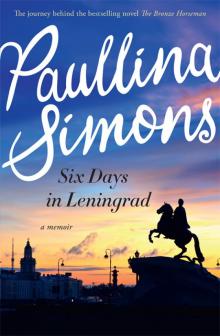 Six Days in Leningrad
Six Days in Leningrad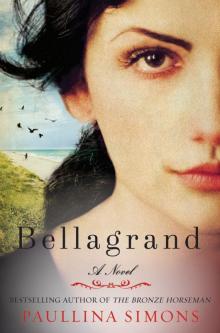 Bellagrand
Bellagrand Tatiana and Alexander
Tatiana and Alexander Road to Paradise
Road to Paradise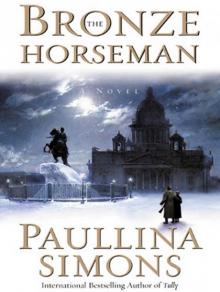 The Bronze Horseman
The Bronze Horseman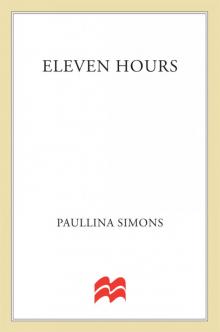 Eleven Hours
Eleven Hours Tatiana's Table: Tatiana and Alexander's Life of Food and Love
Tatiana's Table: Tatiana and Alexander's Life of Food and Love The Girl in Times Square
The Girl in Times Square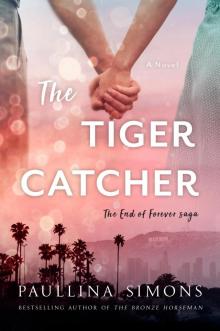 The Tiger Catcher
The Tiger Catcher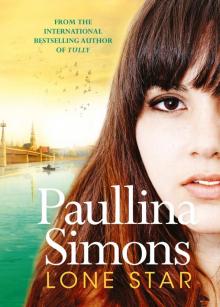 Lone Star
Lone Star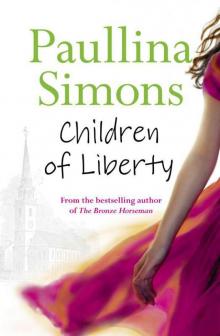 Children of Liberty
Children of Liberty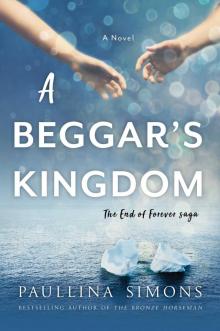 A Beggar's Kingdom
A Beggar's Kingdom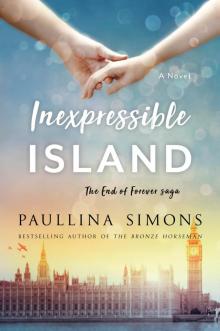 Inexpressible Island
Inexpressible Island Tatiana and Alexander: A Novel
Tatiana and Alexander: A Novel Tatiana's Table
Tatiana's Table A Song in the Daylight (2009)
A Song in the Daylight (2009)